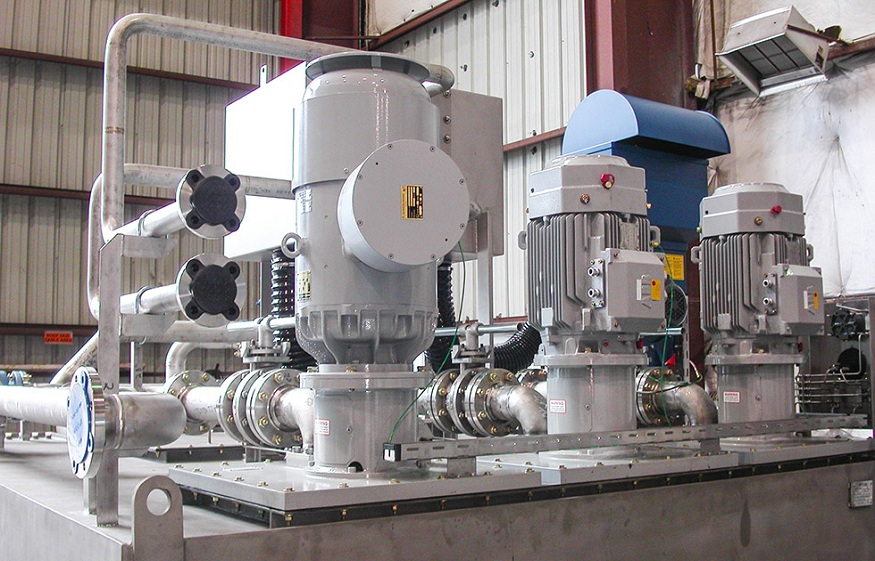What Is a Lube Oil Pump? Understanding Its Role in Industrial Systems

Modern industries rely on the seamless operation of heavy-duty machines to maintain productivity, precision, and performance. At the heart of these machines lies a component that often goes unnoticed but plays a vital role in ensuring everything runs smoothly—the lube oil pump. Whether in manufacturing plants, power generation systems, or large engines, lube oil pumps are indispensable in maintaining operational efficiency and preventing catastrophic failures.
This article explores the fundamentals of lube oil pumps, their role in industrial systems, the types available, and why working with experienced oil pump manufacturers can make all the difference.
What Is a Lube Oil Pump?
A lube oil pump is a mechanical device designed to circulate lubrication oil under pressure to various parts of a machine. Its primary purpose is to reduce friction between moving parts, dissipate heat, and remove contaminants. This consistent supply of clean, pressurized oil extends equipment lifespan and improves overall performance.
From turbines and compressors to large engines and gearboxes , lube oil pumps ensure that metal components do not overheat or seize due to inadequate lubrication.
Why Lube Oil Pumps Are Essential in Industrial Systems
1.Minimizing Friction and Wear
Industrial machines often operate under extreme loads and high temperatures. Continuous friction between metal parts can lead to rapid degradation. Lube oil pumps deliver oil that creates a thin film between moving surfaces, reducing direct contact and preventing premature wear.
2. Maintaining Temperature Control
Lubricating oil doesn’t just reduce friction—it also helps to carry away heat from components. As machines run, parts like bearings, gears, and shafts heat up. Circulating oil absorbs this heat and transports it to an external cooler, ensuring the system stays within safe temperature limits.
3. Cleaning and Filtering Contaminants
Debris, dust, and metal shavings can accumulate within industrial systems. Lube oil, circulated by the pump, helps carry these contaminants to filters. Clean oil means fewer maintenance problems and a reduced risk of internal damage.
4. Ensuring System Reliability and Longevity
Proper lubrication through high-performance lube oil pumps reduces the frequency of breakdowns and the need for major overhauls. This translates into better uptime and lower maintenance costs for industries that rely on continuous operation.
Key Components of a Lube Oil Pump System
Understanding how a typical lube oil pump functions can help plant operators and engineers troubleshoot issues before they escalate. A complete lubrication system generally includes:
- Reservoir or sump: Holds the lubricant.
- Pump unit: Pressurizes and circulates the oil.
- Cooler: Dissipates heat from the circulating oil.
- Filters: Remove particulate matter and contaminants.
- Distribution lines: Carry oil to specific machinery points.
- Pressure regulators and safety valves: Ensure proper flow and prevent overpressure.
Each component must work harmoniously, and selecting the right type of lube oil pump is crucial to system efficiency.
Types of Lube Oil Pumps Used in Industry
Industrial applications use different types of lube oil pumps based on specific requirements such as pressure, viscosity, and flow rate. The most common types include:
1.Gear Pumps
These pumps use meshing gears to transfer oil. They’re simple, reliable, and well-suited for medium-pressure applications.
2. Vane Pumps
Vane pumps use sliding vanes to move oil through a cavity. They’re quiet and efficient, ideal for moderate viscosity oils.
3. Screw Pumps
Screw pumps use two or more intermeshing screws to pump oil. They’re known for delivering a steady flow with low pulsation, perfect for high-volume operations.
4. Centrifugal Pumps
These are commonly used when large volumes of low-viscosity oil need to be moved quickly, such as in cooling applications.
5. Piston Pumps
These pumps are high-pressure performers that deliver oil in precise, metered amounts. They’re often found in systems requiring fine-tuned control.
Each type has specific use cases, and working with specialized oil pump manufacturers can help determine the best fit for your machinery.
Applications Across Industries
Lube oil pumps are critical across various industrial sectors. Here’s where they make a significant impact:
- Power Generation: Turbines and generators require constant lubrication to handle high loads and maintain thermal stability.
- Automotive and Heavy Engines: Diesel and marine engines depend on oil pumps for consistent lubrication during prolonged operation.
- Manufacturing: CNC machines, presses, and robotics require precise and clean lubrication to avoid downtime.
- Oil and Gas: Compressors and pumps in refineries use robust lubrication systems to manage extreme pressures and temperatures.
- Steel and Mining: Equipment in these sectors endures harsh environments, making reliable lubrication systems essential for longevity.
Factors to Consider When Selecting a Lube Oil Pump
Not all lube oil pumps are created equal. Selecting the right pump involves careful evaluation of system requirements. Key considerations include:
- Oil Viscosity: Heavier oils require pumps with higher torque and stronger seals.
- Operating Temperature: Choose materials that can handle temperature extremes without degradation.
- Flow Rate and Pressure: Each application demands specific pressure and flow characteristics.
- Contaminant Load: High-particulate environments require pumps with advanced filtration capabilities.
- Compatibility with Existing Systems: Ensuring the pump fits into the current setup helps avoid costly retrofits.
Collaborating with established oil pump manufacturers helps ensure your system gets a pump built to exact specifications, improving overall efficiency and reliability.
Maintenance Best Practices for Lube Oil Pumps
Regular maintenance is essential to get the best performance and longevity from your lube oil pump. Here are a few practices to follow:
- Monitor Oil Quality: Use sensors or testing kits to track oil contamination and degradation.
- Inspect Filters Frequently: Clean or replace filters regularly to avoid clogging.
- Check for Leaks and Noise: Unusual sounds or visible leaks can signal wear or internal damage.
- Maintain Proper Oil Levels: Low oil can lead to pump cavitation and overheating.
- Schedule Periodic Overhauls: Even the best pumps wear out—plan routine inspections to prevent unexpected failures.
Why Choose Reliable Oil Pump Manufacturers?
Choosing a pump is not just about specs—it’s about performance, reliability, and service. Partnering with reliable oil pump manufacturers ensures:
- Customized solutions for your unique industrial setup
- Access to technical expertise and application-specific advice
- Spare parts availability and after-sales support
- Compliance with international safety and quality standards
Investing in quality pumps upfront often pays off in reduced maintenance costs and better system uptime over the long run.
In the vast ecosystem of industrial machinery, lube oil pumps play the quiet yet vital role of maintaining operational integrity. They reduce friction, manage heat, and ensure that machines perform at their peak. As industries push for greater efficiency and uptime, understanding the role of these pumps becomes more critical than ever.
Whether you are designing a new system or upgrading an existing one, choosing the right lube oil pump—and the right partner to supply it—can make a profound difference. Pay attention to the specifications, monitor performance regularly, and always prioritize quality when selecting from the many oil pump manufacturers available in the market.
A well-oiled machine isn’t just a metaphor—it’s a reality powered by the humble yet powerful lube oil pump.






